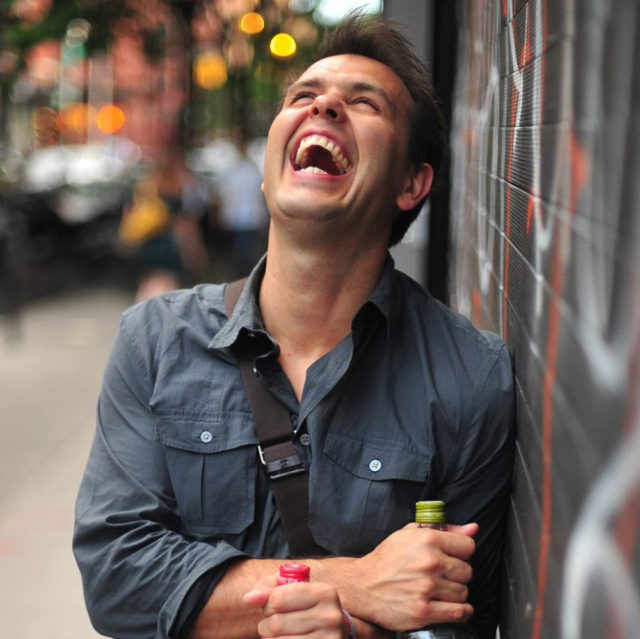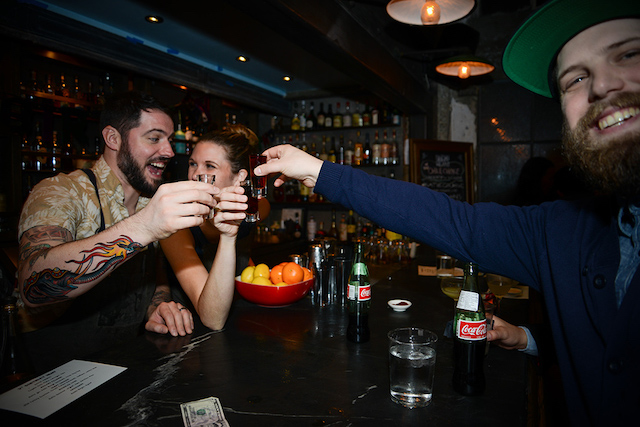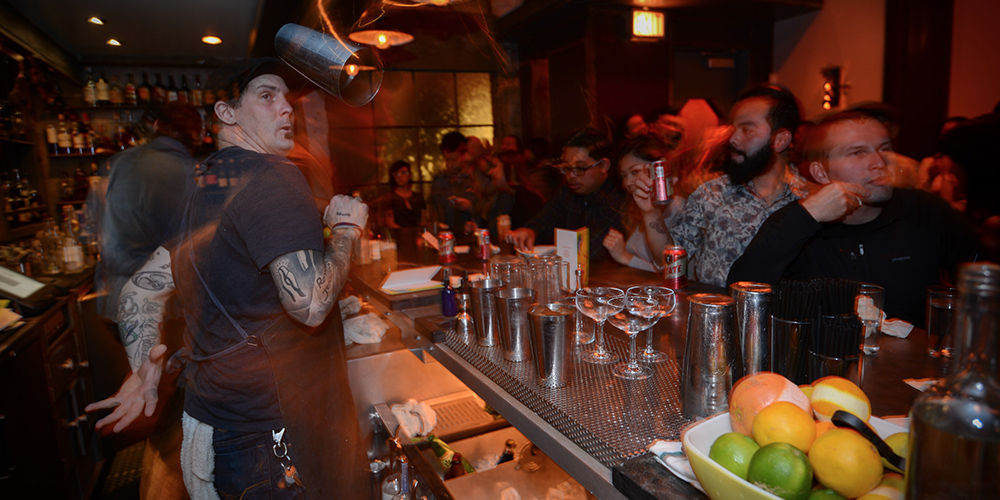On an unusually cold winter’s night in Atlanta, tucked into a corner of the always bumpin’ Krog Street Market, Ticonderoga Club is pleasantly crowded with a packed bar and bustling dining room. The restaurant patrons are buzzing with Friday-night-joy of a particular kind — most of the city’s residents had been sent home from work early, a precaution taken for what was only the mildest of snows, and this was obvious cause for celebration.
It’s about 10 p.m. and the evening is in full swing, when there’s a flicker and then darkness, save for one flood lamp spouting bright white light sufficient only to see silhouettes of startled expressions. At this moment, the valiant Greg Best, co-owner and head bartender, leans over the bar and rings the captain’s bell that dangles from its helm. He assures the room that all is well, and warmly encourages everyone to continue enjoying their food and drink.
What ensued was a genuinely fun night, fostered in what could have been a tense situation — no lights, no credit card machines, beer and wine only and people prone to panic — but at Ticonderoga, the spirit of fun is at its foundation.
Best and his fellow co-founders dreamed up Ticonderoga as a deliberate sidestep from bars that take themselves much too seriously. The restaurant and bar, themed loosely around the kind of New England taverns that have random memorabilia and a whole neighborhood in regular attendance, opened in late fall of 2015 with lighthearted irreverence on wide display.
For some, it may seem outrageous to think that fun ever disappeared from the bar scene. At its best, drinking is convivial, festive and communal. But many imbibers and barkeeps alike have noticed a shift toward the solemn and serious, whether it’s being denied a simple vodka drink or snubbed for liking coconut rum. With bars like Ticonderoga prizing good times over pretense, it seems that attitude is shifting.
“I think right now what we’re seeing is a really interesting and, I think, kind of confused time of bartending,” says Best.
The cocktail industry’s glorious boom and the proliferation of creative cocktail culture is both what Best blames and applauds. “… Cocktails became a part of the actual verbiage of a restaurant, which is really great — it made room for creativity and for really exuberant personality growth,” Best says. “We got this kind of celebrity-ism of bartenders and the rebirth of the mixologist and all of this, and now I think we’re living in this time when half of the people who do that are kind of turning away from that, because it’s become a caricature of what they set out to do.”
No one could argue that the worldwide cocktail craze hasn’t been mutually beneficial for those who work in and those who frequent bars, but it’s reached some strange extremes — like bars themed around mustaches, canned food and your (British) grandmother’s house.
“You can only become hyper specialized to a degree and after that tipping point, I think it just becomes too precious,” says Best, “and then it doesn’t feel natural anymore. And that, I think, is the danger of where we stand today … the art side has become the comedy.”
![]() Greg Best, co-founder of Ticonderoga Club, assists guests on their signature mallard telephone — just one of many ways they set out to be “a little bit like classic Looney Tunes.” Photo by Jodi Cash.
Greg Best, co-founder of Ticonderoga Club, assists guests on their signature mallard telephone — just one of many ways they set out to be “a little bit like classic Looney Tunes.” Photo by Jodi Cash.
Footloose and fancy free
Best isn’t the only bartender who watched with raised eyebrows as fun exited the cocktail scene — it was also an observation of Scott Baird, the founding partner of the Bon Vivants and co-owner of Trick Dog.
Baird also had front row seats to the cocktail revolution.
“There was a rapid change since five years ago,” Baird says. “We were just grinding it out and trying to get people to not drink Lemon Drops and trying to get people not to freak out if you put egg whites in a cocktail. And maybe we can thank the Food Network, but five to seven years ago people started to take the bait and get into it — people started to engage in this nerdy stuff we’d been pushing for years at that point.”
But as cocktail culture caught on and drinkers and bartenders alike got serious about their cocktails, some bar atmospheres shifted toward the somber. “It took all of the fun out of going out and having a tipple at the end of your day and week,” he says.
Baird’s answer was to open Trick Dog, where cocktails are “delicious, not precious.” This San Francisco cocktail bar is renowned for their downright silly yet splendidly well-executed menus — like one themed around a dog calendar, another based on conspiracy theories, and one modeled after a guide pamphlet to San Francisco — to name a few.
“We just want you to have a good time and hopefully ask for someone’s number,” he says. “And just know that the things you’re going to get are going to come out quickly and be tasty, but they’re not going to be so much that you’re not going to be able to gulp it down in five swigs if you want to on a Friday afternoon.”
Baird’s attitude is mirrored at Ticonderoga Club.
“We were setting out to be irreverent in a positive way, we’re not going to be cynical and we’re not going to be degrading to anyone else, and we’re not going to be condescending to our patrons, and we’re not going to be inside jokers,” says Best. “But we plan to be a little bit like classic Looney Tunes — like, let’s just do some weird shit and have fun with it. And immediately, I think our guests responded to it and continue to respond to it.”
It’s worth mentioning that if there’s one room of Ticonderoga Club that best embodies the bar’s philosophy of fun, it’s the bathroom. The wallpaper (which features, among other things, a painted raccoon binge drinking tequila, a lemur playing the accordion and a one-eyed badger enjoying a tropical cocktail) is so good that comedian David Cross came to Krog Street Market just to see it.
![]() The Ticonderoga Club bathroom is sufficiently silly to have drawn comedian David Cross as an admirer. Photo by Jodi Cash.
The Ticonderoga Club bathroom is sufficiently silly to have drawn comedian David Cross as an admirer. Photo by Jodi Cash.
It’s not me; it’s you
Although the inherently fun atmospheres of Ticonderoga and Trick Dog beg the question, “Why so serious?” some claim the perception of solemn bar scenes is little more than a misunderstanding.
“I don’t think the bars were taking themselves seriously, I think they were just trying to provide a different environment for people to enjoy themselves,” says Simon Ford, co-founder of The 86 Co. “You can either be in a bar that has low light and jazz music and you can have a conversation, or you can be in a bar that plays Metallica at high volume, and you can rock out and they’re two different moods for the consumer. One’s not more serious than the other, one of them is just providing a different environment for you to have a good time.”
Ford likens this observation to the Yelp phenomenon, in which misguided users berate an establishment for being exactly what it says it is rather than what he or she wants. In other words, it’s a user error.
Maybe there’s a different kind of fun for everyone, and bars are bearing the brunt for not being something other than what they explicitly advertise. Speakeasies are, to some, the scapegoat of the overly serious bar phenomenon. But Ford says this is also a misconception.
“There’s this notion that a speakeasy is a quiet place … and of course, this couldn’t be further from the truth. Speakeasy is the idea [that] you don’t talk about this place, you don’t tell people about it because it’s a secret, right? But it’s not that you have to be quiet, if you think about what happened in a speakeasy — it was the the roaring ‘20s. You’d go in, and it would be this raucous thing with flapper girls and dancing and everyone having a crazy time.”
Opinions on the atmospheres of modern day speakeasies may differ, but there’s one thing that these three expert bartenders agreed upon: hospitality is key.
 Simon Ford, co-founder of The 86 Co., has no trouble finding fun in all that he does. Photo courtesy of Simon Ford.
Simon Ford, co-founder of The 86 Co., has no trouble finding fun in all that he does. Photo courtesy of Simon Ford.
It all comes down to hospitality
Ultimately, what sets great bars apart is the way guests are made to feel. It’s easy to have fun when being treated with consideration, respect and attentiveness — the taste of a drink and the ambience are only a part of it.
“It’s not just about drinks, it’s not just about fun, it’s about hospitality, making people feel special, providing them with an experience,” says Ford. “You don’t know why someone ever walks through your door — if the reason they walk through the door was because they’ve had a bad day. You don’t know if they came in to celebrate. But any which way, if they’ve had a bad day, it’s your job to make their day just a little bit better than it was, and if they’re celebrating, it’s your job to enhance the celebrations and make them better.”
Paying keen attention to your guests, of course, is a luxury of being confident in your expertise. You have to do your homework and know your restaurant backwards and forwards in order to give someone optimal service. This policy is ingrained in the training at Trick Dog.
“The staff is very hospitality-focused and really well-trained, and they get to be very relaxed and guest-focused,” says Baird.
Being hospitable endears both the bartender and the establishment to its guests, and it presents unique and worthy opportunities.
“… A bartender should be beloved by the people,” says Best. “You’re a servant but you’re also, if you do it well, one of the most trusted individuals in many people’s lives, and that’s a great honor and there’s great nobility there.”
![]() Ticonderoga Club is modeled loosely after the kind of New England bars that both fascinated and terrified Greg Best as a child, with accents of random memorabilia and nautical embellishments like the captain’s chair and the painted lower-bodies of Colonial characters. Photo by Jodi Cash.
Ticonderoga Club is modeled loosely after the kind of New England bars that both fascinated and terrified Greg Best as a child, with accents of random memorabilia and nautical embellishments like the captain’s chair and the painted lower-bodies of Colonial characters. Photo by Jodi Cash.
Good advice for anyone: don’t take yourself too seriously
The role of bartenders in society is an important one, that much we know is true. But the secret to greatness is to keep it all in perspective.
“I think a good bartender understands that they’re part of the bigger picture; however, they can be a conductor of it,” says Ford. “They have the power to make it happen and the ones that are great are the ones that realize that it’s about the customer, the ones that aren’t so great are the ones that think it’s about them. It’s a maturity thing.”
Scott Baird also believes that the good goes both ways when setting vanity aside and taking care of the guest.
“The easy way not to take yourself so seriously is not to think about yourself,” says Baird. “You represent the bar and caring for the guest. The less it is about you and the more it is about them, the reality is, the better you get paid. People really appreciate when your whole spirit of being is about making them feel taken care of.”
None of this is to say you shouldn’t take your job seriously — just the opposite, being serious about your craft empowers you to have fun and share that energy with your guests.
“My advice to bartenders is yeah, you should be serious, you should get to work on time, you should dress yourself accordingly, you should cut your fruit with care and precision, you should wash your floors and organize your rails, because that attention to detail and that methodology in back office logistics allows you to be as much of a circus performer as you want to be,” says Best. “Remember, at the end of the day, we’re all just getting together to talk, have drinks and enjoy ourselves.”
 At San Francisco’s Trick Dog, cocktails are “delicious, not precious,” and that ethos is apparent in all that they do. Photo courtesy of Trick Dog.
At San Francisco’s Trick Dog, cocktails are “delicious, not precious,” and that ethos is apparent in all that they do. Photo courtesy of Trick Dog.





